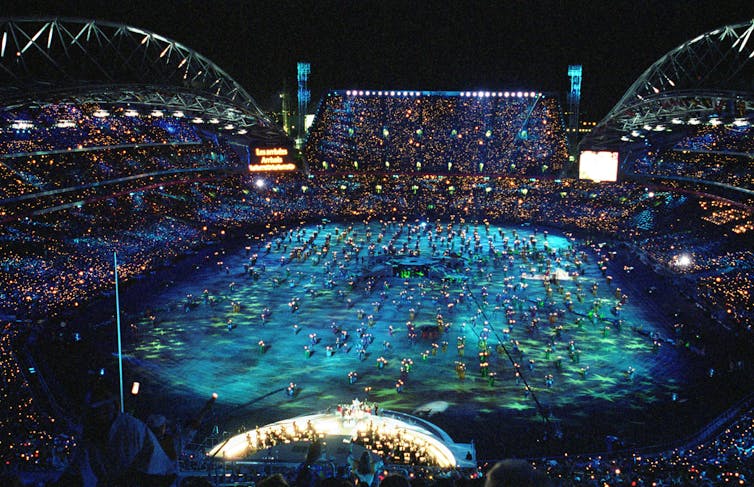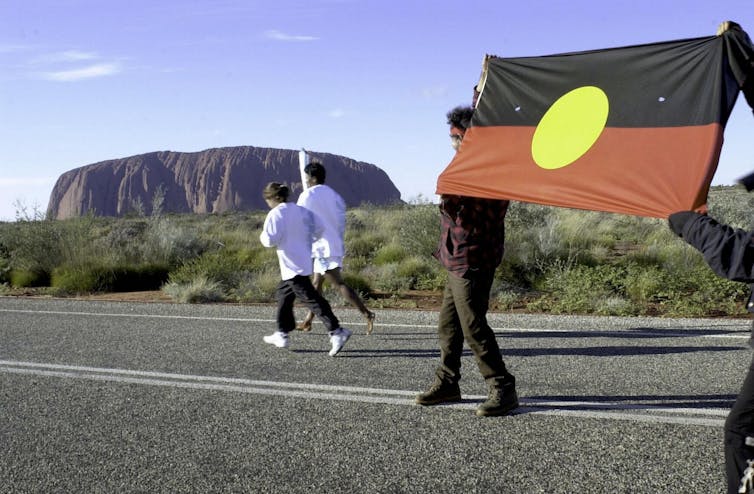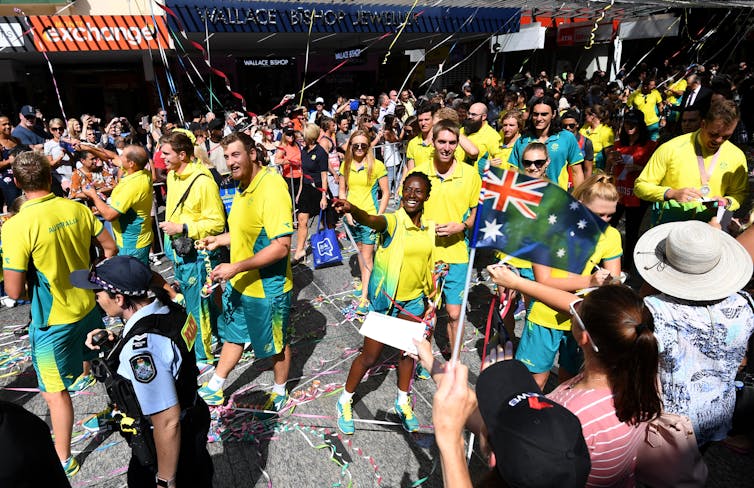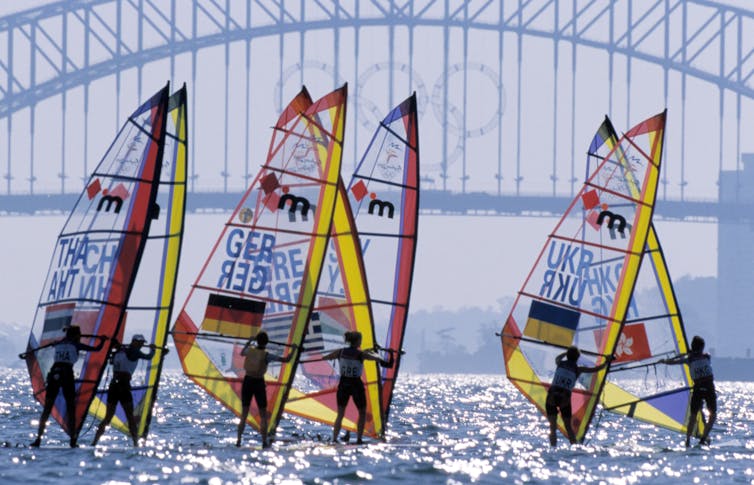Source: The Conversation (Au and NZ) – By David Rowe, Emeritus Professor of Cultural Research, Institute for Culture and Society, Western Sydney University
On Tuesday, it will be 20 years since the Olympic opening ceremony in Sydney, kicking off the “best games ever”.
Our newspapers and TV screens are now awash with nostalgia about great sporting moments and the spectacle and ceremony of the Olympics.
Read more: Freeman review: documentary relives the time Cathy Freeman flew, carrying the weight of the nation
It was certainly a very big party. But with the hindsight of 20 years, other than creating a lot of classic sporting memories, did the Olympics change us?
An ambivalent legacy
There is considerable ambivalence regarding Sydney 2000.The economics of mega sports events are notoriously slippery and difficult to work out.
In 1993, KPMG estimated there would a more than $7 billion benefit to the national economy. But subsequent analyses produced other figures. A 1998 estimate by University of Tasmania and NSW Treasury economists suggested there would be only a 0.11% effect on GDP over the 12-year Olympic phase.
On other measures, the impact is also difficult to see.
The Olympics did not generate a sustained increase in sport participation in Australia. And its legacy as a “Green Games” is debatable.
The main Olympic site did create usable space and parklands on what was a huge, derelict industrial site in Sydney’s west. The athlete’s village also became a solar-powered suburb. But two decades on, Sydney Olympic Park is still searching for a soul during the working week.
A global Australia
So, where did Sydney 2000 leave its biggest mark on 21st century Australia?
Australia had held the Olympics before Sydney, but Melbourne in 1956 was a very different affair. There were fewer than 100,000 television sets in the country and no live international satellite transmission.
Sydney 2000 provided a striking opportunity for Australia to project a global image as a sophisticated, multicultural nation.

Although Olympic tourism promotion relied heavily on Australia’s natural environment, its strategy made room for showing Australia as a highly urbanised, culturally diverse society.
Most importantly, Australia avoided the huge reputational hit of getting the games “wrong”. Only four years earlier, the 1996 Atlanta Olympics were widely criticised for being poorly organised and over-commercialised. It also had to contend with a domestic terrorist bombing.
The Sydney games, supported by an army of volunteers, generally went off without a hitch and received plenty of plaudits. It generated goodwill on which the city and country could trade, literally, in ensuing decades.
Indigenous Australia
In the lead up to the games, I was interviewed by a number of foreign journalists doing background stories. One topic dominated all others – the state of Indigenous relations in Australia.
Journalists were all too aware Aboriginal and Torres Strait Islanders had mooted a boycott of the games, perhaps supported by some African nations, due to Australia’s maltreatment of its Indigenous peoples.
A considerable effort was made by the Sydney Olympic organising committee to involve First Australians. As a result, one of the most powerful and enduring themes of the games was Indigenous Australia.
It ran through the Cultural Olympiad’s Festival of the Dreaming, the Olympic Park’s Aboriginal cultural pavilion and the arrival of the Olympic torch at Uluru.

The opening ceremony featured multiple Indigenous-themed segments, while the closing ceremony showcased Christine Anu’s performance of “My Island Home”. In their performances, Midnight Oil and Savage Garden also wore “Sorry” and Indigenous flag clothing.
And most memorably, Cathy Freeman lit the Olympic cauldron and won the women’s 400 metres, bearing the sky high expectations of the nation as she ran.
In the era of Black Lives Matter, nobody could claim that Sydney 2000 had a transformative impact on Indigenous peoples’ futures.
Read more: Why the Black Lives Matter protests must continue: an urgent appeal by Marcia Langton
But its legacy – that any representation of Australia must always have a deep, serious Indigenous presence – should not be underestimated.
Sporting Australia
As the largest sporting event ever held in Australia, the Sydney games had a ripple effect across the entire sport landscape in the country.
Its success signalled that Australia was capable of hosting mega sport events with efficiency and flair.
Sydney 2000 set the standard for several Australia-hosted major sport events to follow — the 2003 Rugby World Cup, 2006 and 2018 Commonwealth Games, 2015 AFC Cup, 2015 Cricket World Cup and 2020 Women’s T20 Cricket World Cup.

It also gave confidence for the (albeit unsuccessful) bid for the 2022 FIFA Men’s World Cup and the successful bid for the 2023 FIFA Women’s World Cup.
The Olympics paved the way for successive Australian sports diplomacy strategies. These include promoting Australia’s expertise in helping other countries host major events, not least their opening and closing ceremonies.
Importantly, Sydney also provided a very substantial boost to the Paralympic Games, a legacy of which the nation can be justly proud.
Read more: A brief history of the Paralympic Games: from post-WWII rehabilitation to mega sport event
Australia was already a renowned sporting nation before Sydney 2000. Afterwards, it could claim to be an influential player in global sport.
The lucky games
The Sydney games were fortunate the 9/11 bombers did not make their move in New York precisely one year earlier, which would have meant disruption and possible cancellation.

Unlike the postponed Tokyo 2020 (and possibly cancelled) Tokyo 2021 Games, Sydney was also lucky not to coincide with a global pandemic.
Sydney 2000 shows that legacy is, finally, dependent as much on luck as good planning. But those 17 days in September linger as a significant moment in Australia’s sporting and social history, when the country was at the heart of the global village.
– ref. The Sydney Olympics: How did the ‘best games ever’ change Australia? – https://theconversation.com/the-sydney-olympics-how-did-the-best-games-ever-change-australia-145926







